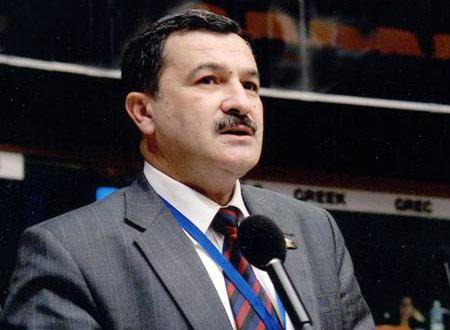Stalled Karabakh settlement prompts views on NATO's involvement

By Sara Rajabova
Stalled resolution of the Nagorno-Karabakh conflict between Azerbaijan and Armenia and the lack of results of the OSCE Minsk Group co-chairs' mediating efforts have prompted views on the involvement of a powerful military bloc in the conflict settlement process.
As a result of the conflict lingering on for over 20 years, some suggestions are being voiced about NATO's involvement in the peace process.
However, others rule out the involvement of the military bloc in the Nagorno-Karabakh conflict resolution.
Commenting on the issue, Aydin Mirzazade, an Azerbaijani MP and member of the Political Council of the ruling Yeni (New) Azerbaijan Party, told Azernews that he believes that it is not correct to draw any external military force to the settlement of the Nagorno-Karabakh conflict.
"This would lead to internationalization of the problem and involvement of new forces and states in the conflict," he said.
Mirzazade pointed out that it is a problem between the two countries: Armenia occupied a part of the Azerbaijani territory and Azerbaijan should resolve the issue either militarily or peacefully.
Recently, another lawmaker, Zahid Oruj, who is a member of the Azerbaijani delegation to NATO PA, told Trend news agency that NATO has real power and contingent to monitor and control all regional and international developments, therefore, it is important to draw the organization to the settlement of the Nagorno-Karabakh problem.
"Despite the fact that we are members of the Non-Aligned Movement, currently it is NATO that is a non-alternative military-political 'umbrella' of the world, a format of security. If Azerbaijan has not acceded to the military blocs created by Russia, and at the same time, if it is impossible to maintain neutrality in the region, as Switzerland does, then we need to redouble further efforts to establish close and intensive relations with NATO," Oruj said.
According to him, it is unnecessary to worry about the attitude of NATO towards the Nagorno-Karabakh issue, as well as toward Azerbaijan.
"An entity like NATO knows whence the problems in this region originate and therefore does not want to openly interfere in the conflict. But at the summits of the organization in Washington and Istanbul, documents that protect the territorial integrity of Azerbaijan were adopted. Any agreement which will be signed on the settlement of the Nagorno-Karabakh conflict should be enforced with the help of certain power. And then NATO will be remembered, because the OSCE does not have a military structure," Oruj said.
However, Aydin Mirzazade believes that NATO might make a decision on the issue of Nagorno-Karabakh, but its involvement in the resolution of the conflict could lead to the involvement of other military forces in the future.
"Azerbaijan has received the support of international organizations over the solution of the problem by political means and will continue this policy in the future," Mirzazade added.
Furthermore, NATO said there is no alternative to a peaceful settlement of the conflict.
NATO Secretary General Anders Fogh Rasmussen said earlier that the resolution of the Nagorno-Karabakh conflict requires dialogue between the conflict parties, readiness for compromise and cooperation.
"NATO is not directly involved in the resolution of the Karabakh conflict. However, we support and will further continue supporting the Minsk process and the efforts aimed at achieving a peaceful settlement of this conflict," Rasmussen said during a visit to Azerbaijan in September 2012.
Mediators' 'diplomatic activity' seen as insufficient
Commenting on the visits of the OSCE Minsk Group co-chairs to the region, Aydin Mirzazade said they arrange meetings of the presidents and also consultations between the foreign ministers of the two countries continue.
"However, unfortunately, it simply does not go beyond diplomatic activity. The co-chairs don't call invader Armenia by its real name. They simply conclude their activity by arranging meetings of the conflict parties. But the Minsk Group was established to find solutions for the resolution of the conflict. However, currently we don't see such activity by the Minsk Group," Mirzazade noted.
Mirzazade also touched upon Russia's role in the settlement of the conflict. He pointed out that Russia is not an outside force, it is a country bordering the region and also one of the co-chairs of the OSCE Minsk Group.
"Its active participation in the solution of the problem is both possible and desirable. So, if on its end it holds meetings and provides suggestions, this can only be applauded," Mirzazade said.
The Nagorno-Karabakh conflict emerged in 1988 when Armenia made territorial claims against Azerbaijan. Since a lengthy war in the early 1990s that displaced over one million Azerbaijanis, Armenian armed forces have occupied over 20 percent of Azerbaijan's internationally recognized territory, including Nagorno-Karabakh and seven adjacent regions. The UN Security Council has adopted four resolutions on Armenia's withdrawal from the Azerbaijani territory, but Armenia has not followed them to this day.
Russia, France and the U.S. have long been working to broker a solution of the Nagorno-Karabakh conflict through the Minsk Group, but their efforts have been largely fruitless so far.
Peace talks are underway on the basis of a peace outline proposed by the Minsk Group co-chairs and dubbed the Madrid Principles, also known as Basic Principles. The document envisions a return of the territories surrounding Nagorno-Karabakh to Azerbaijani control; determining the final legal status of Nagorno-Karabakh; a corridor linking Armenia to the region; and the right of all internally displaced persons to return home.
Here we are to serve you with news right now. It does not cost much, but worth your attention.
Choose to support open, independent, quality journalism and subscribe on a monthly basis.
By subscribing to our online newspaper, you can have full digital access to all news, analysis, and much more.
You can also follow AzerNEWS on Twitter @AzerNewsAz or Facebook @AzerNewsNewspaper
Thank you!
